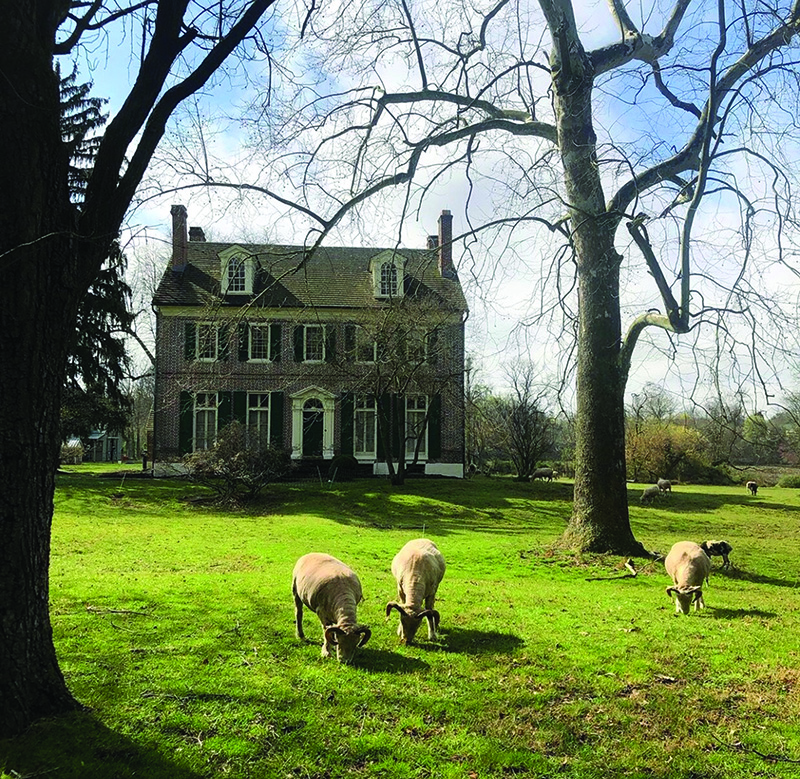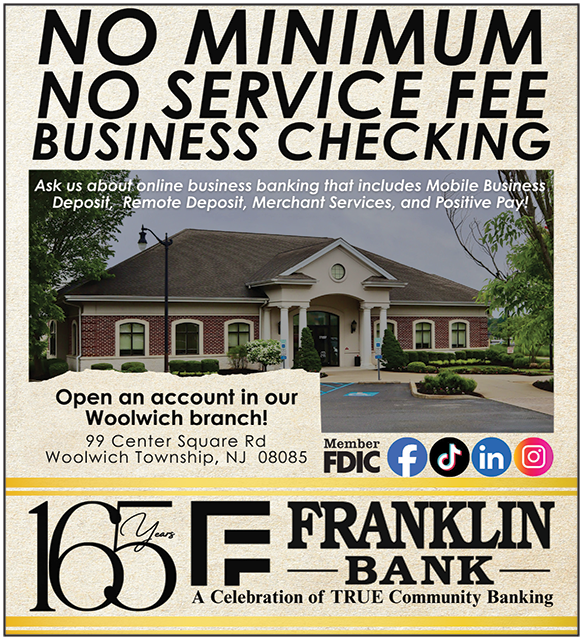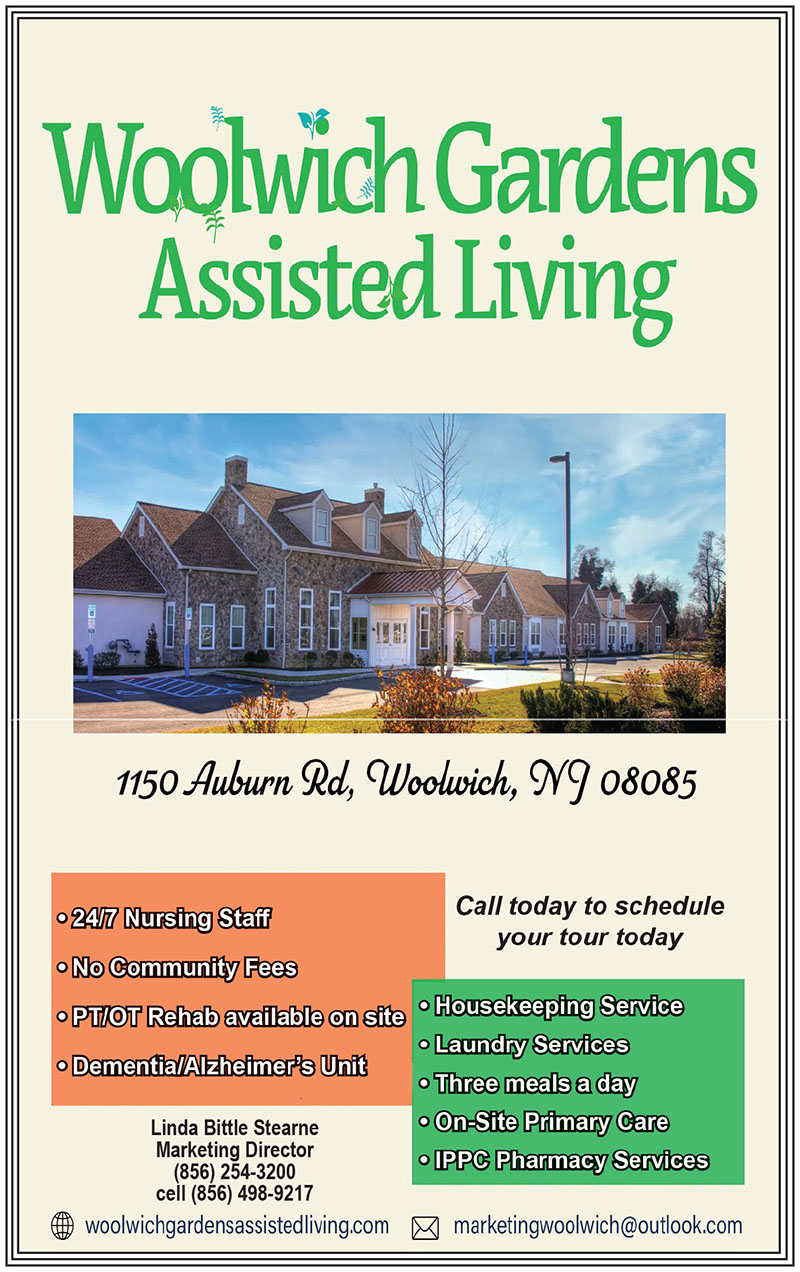Stratton Hall stands as a testament to the enduring value of history, education, and architectural beauty in Woolwich Township.
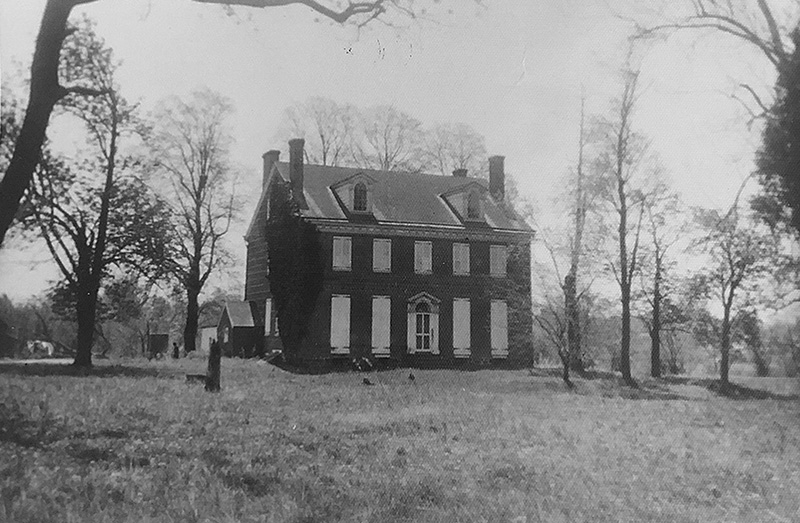
Located at 538 Kings Highway, this historic building, nestled within the heart of its community, has witnessed the passage of centuries and generations, each leaving a lasting mark on its storied walls. The story of Stratton Hall is one of remarkable individuals, architectural elegance, and significant impact on both local and broader historical narratives. The tale is now continuing to be penned by current caretaker Jo Ann Laughlin.
Laughlin illustrates the deep roots and sturdy walls delving deep into the beginning of this historical home. Stratton Hall’s origins trace back to the late 18th century, a period of growth and architectural innovation.
Dr. James Stratton (1755-1812), a dedicated medical professional who served as a surgeon’s assistant during the Revolutionary War, is the man behind the first bricks of Stratton Hall. After his service, he returned home to establish a medical practice.
During George Washington’s first term as president, Dr. Stratton began purchasing parcels of land where he would ultimately build his family home. The construction of Stratton Hall was completed in 1794.
Dr. Stratton’s personal life was marked by both tragedy and resilience. His first wife, Anna, died shortly after giving birth to their third child. In 1787, he married Mary Creighton of Haddonfield, which brought renewed stability and joy to his life.
The hall was a brick structure built on a fieldstone foundation, blending the Federal and Georgian styles of construction. Its north facade features a decorative pattern of glazed header bricks, while the Georgian elements are evident in its center hall plan.
Federal design touches include a front door framed with columns and pediments topped with an arched fanlight window, slender arched dormer windows with beautifully carved moldings, and delicately carved fireplace surrounds and mantels. These elements combine to create a building that is both grand and welcoming, reflecting the values and aspirations of its builder.
The legacy of Dr. James Stratton continued through his children, his son, Charles Creighton Stratton (1796-1859). Charles became a lawyer and rose to prominence as a U.S. Congressman from New Jersey.
Remarkably, he became the state’s first governor to be popularly elected by the people and remains to date the only individual from Gloucester County to have held this position.
A young man ruled by ambitions, Charles studied at Queens College (now Rutgers University) and returned to his family’s estate at Stratton Hall, where he pursued a career in politics, serving as a county freeholder, State Assemblyman, and U.S. Congressman.
In 1869, the property left the Stratton family’s ownership when James D. Gibbs, a Philadelphia businessman, purchased it as a summer retreat for his family. The Gibbs family introduced several Victorian modifications to the building, including the construction of a covered verandah and the replacement of the original front windows with tall French doors that opened onto the verandah.
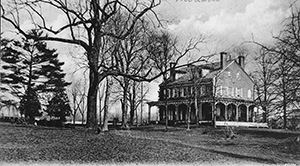
Though the verandah has since been removed, these changes depict the evolving nature of the building’s aesthetic.
After Charles Gibbs died in the 1930s, the property changed hands several times before being acquired by its current owner, Jo Ann Laughlin, in 1984.
Despite these changes, Stratton Hall retains many of its original features, including windows, doors, wood floors, and plaster walls, preserving the historical integrity of this architectural gem.
Laughlin has not only preserved its historical essence but has managed to embody environmental stewardship and community inclusion. Recycling is enforced, along with the use of cloth bags for grocery shopping, and burning wood from fallen trees on the farm to reduce oil consumption. These practices reflect their commitment to sustainability and environmental preservation.
Laughlin restored and maintained Stratton Hall in compliance with its 18th-century design to conserve energy. In the fall of 2011, a 9.66 kW fixed ground-mount solar PV system was mounted in a former sheep pen. This system supplies all the electrical power used on the farm, with excess energy diverted to the public power grid, demonstrating a devoted commitment to sustainable living.
Aside from being a historical marking in Woolwich Township, Stratton Hall also stands as a place for the community. With open arms, visitors are invited to participate and embark on various farm tours and activities.
They offer a unique “Pick Your Own Chicken Eggs” experience and host writers’ and artists’ days on the farm, providing a scenic and calming environment for creative work.
Laughlin also shares that the farm has also held many special events, sharing, “We’ve hosted Christmas house tours, Civil War reenactments, garden parties, school trips, and church fundraisers. It’s been a site that has been available to help other organizations and the community.”
Laughlin peers forward to upcoming events, “In the summer we host a Christmas in July event, where people can come and browse what we offer and maybe get a good head start on their Christmas shopping. We hope to help them make the shopping experience more pleasurable.
“We will also be having a specialty coffee and latte vendor here. They will be offering various beverages for sale as people shop and enjoy.”
In addition to being a place for warm reception, the farm also raises heritage breeds of sheep, chickens, and ducks, with products such as eggs, wool, and fleeces available for sale.
Laughlin elaborated on the various breeds of animals they house, stating, “We have a few different breeds of sheep, Horned Dorset, Jacob Sheep, Leicester, Longwool. We also raise a variety of chickens, lots of chickens, different varieties, a heritage breed called the Dominique chicken, which was considered the first breed of American chickens.”
She goes on to add, “We also raise a heritage breed of Indian Runner Ducks, from them we are able to sell fresh eggs, along with the other products we sell. For example, we sell photographs of the farm, the house, the animals, sheepskin pelts, and woven throws made from wool.”
Stratton Hall’s significance extends beyond its architectural beauty and historical associations. It serves as a symbol of the importance of preserving our historical and cultural heritage.
Each generation that has lived in or interacted with Stratton Hall has contributed to its rich array of stories, ensuring that it remains a vibrant part of the Swedesboro community.
When asked if she ever plans to sell Stratton Hall, Laughlin candidly shares, “No one’s getting younger right? At some point, the answer will be yes. I don’t have any immediate plans, and I hope to enjoy myself here a little longer. But at some point, it will be a good time to pass the house along to the next generation of folks who will be its caretakers.”
She goes on, “We look at ourselves as caretakers of a local community resource and important historical site. So, we’re not necessarily the owners of it. We’ll be here caretaking until the next family comes along, ready to pick up where we left off and take it into the next few decades.”
Laughlin herself has documented the rich history of the Stratton home in two books. One is titled, The Wedding Trees, which is a children’s book inspired by nature and the beautiful Linden Trees that are on the property.
The other book she penned is titled, Stretching For A House With A Name, is in its final editing stages, and Laughlin hopes for it to be published sometime by the end of this year. The book will explore its Native American and colonial roots, as well as the lives of enslaved individuals associated with the property, while shedding light on often overlooked aspects of the region’s history.
As she reflects on her writing and research process, she touches on her research on the implications of slavery, “What they did going from a state of enslavement to freedom, I was in complete awe of what they accomplished. There may be local families who may find something about their family history in this. Nevertheless, it will be inspiring to everyone who reads this particular part of the book as well.”
Stratton Hall is more than just a building. It is a symbol of living history, culture, environmental hope, and community engagement. The careful preservation of Stratton Hall allows current and future generations to connect with the past, providing a concrete link to the early years of American History and the hands who helped shape it.
Its legacy is a testament to the enduring impact that a single structure can have on its community and beyond, harvesting inspiration within future generations to appreciate and preserve the treasures of the past. The dedication of Jo Ann Laughlin and all the caretakers that came before ensures that Stratton Hall will continue to be a source of inspiration and learning for many years to come.

